Snopes: The Hamlet, The Town, The Mansion 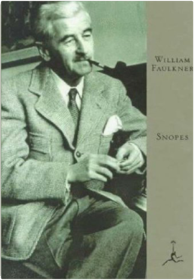 The Sound and the Fury: The Corrected Text 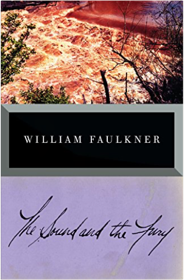 “I give you the mausoleum of all hope and desire. . . . I give it to you not that you may remember time, but that you might forget it now and then for a moment and not spend all of your breath trying to conquer it. Because no battle is ever won he said. They are not even fought. The field only reveals to man his own folly and despair, and victory is an illusion of philosophers and fools.” —from The Sound and the Fury A Summer of Faulkner: As I Lay Dying/The Sound and the Fury/Light in August 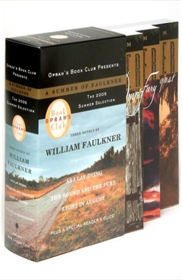 Titles include: As I Lay Dying This novel is the harrowing account of the Bundren family’s odyssey across the Mississippi countryside to bury Addie, their wife and mother. Told in turns by each of the family members–including Addie herself–the novel ranges in mood from dark comedy to the deepest pathos. Originally published in 1930. The Sound and the Fury First published in 1929, Faulkner created his “heart’s darling,” the beautiful and tragic Caddy Compson, whose story Faulkner told through separate monologues by her three brothers–the idiot Benjy, the neurotic suicidal Quentin and the monstrous Jason. Light in August Light in August, a novel about hopeful perseverance in the face of mortality, features some of Faulkner’s most memorable characters: guileless, dauntless Lena Grove, in search of the father of her unborn child; Reverend Gail Hightower, who is plagued by visions of Confederate horsemen; and Joe Christmas, a desperate, mysterious drifter consumed by his mixed ancestry. Originally published in 1932. Take a seat in Oprah’s Classroom and sign up for Faulkner 101 on www.oprah.com/bookclub. William Faulkner : Novels 1930-1935 : As I Lay Dying, Sanctuary, Light in August, Pylon 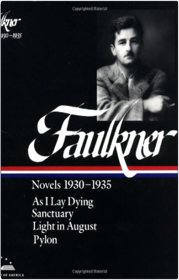 William Faulkner : Novels 1936-1940 : Absalom, Absalom! / The Unvanquished / If I Forget Thee, Jerusalem / The Hamlet 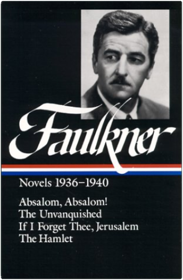 William Faulkner : Novels 1942-1954 : Go Down, Moses / Intruder in the Dust / Requiem for a Nun / A Fable 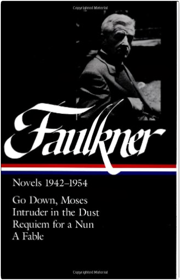 William Faulkner: Novels 1926-1929: Soldiers' Pay / Mosquitoes / Flags in the Dust / The Sound and the Fury 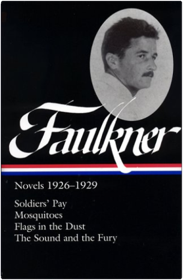 In these four novels we can track Faulkner's extraordinary evolution as, over the course of a few years, he discovers and masters the mode and matter of his greatest works. Soldiers' Pay (1926) expresses the disillusionment provoked by World War I through its account of the postwar experiences of homecoming soldiers, including a severely wounded R.A.F. pilot, in a style of restless experimentation. In Mosquitoes (1927), a raucous satire of artistic poseurs, many of them modeled after acquaintances of Faulkner in New Orleans, he continues to try out a range of stylistic approaches as he chronicles an ill-fated cruise on Lake Pontchartrain. With the sprawling Flags in the Dust (published in truncated form in 1929 as Sartoris), Faulkner began his exploration of the mythical region of Mississippi that was to provide the setting for most of his subsequent fiction. Drawing on family history from the Civil War and after, and establishing many characters who recur in his later books, Flags in the Dust marks the crucial turning point in Faulkner's evolution as a novelist. The volume concludes with Faulkner's masterpiece, The Sound and the Fury (1929). This multilayered telling of the decline of the Compson clan over three generations, with its complex mix of narrative voices and its poignant sense of isolation and suffering within a family, is one of the most stunningly original American novels. The editors of this volume are Joseph Blotner and Noel Polk. Joseph Blotner, who wrote the notes, is professor of English emeritus at the University of Michigan. Biographer of William Faulkner and Robert Penn Warren, he is a member of the Fellowship of Southern Writers and the French Legion of Honor. Noel Polk is professor of English at Mississippi State University and editor of The Mississippi Quarterly. He has edited the texts in all five volumes of William Faulkner's novels for The Library of America. In his first four novels, William Faulkner moved beyond early experiments to discover the themes and style of his maturity. With Soldiers' Pay, a sardonic distillation of postwar disillusionment, and Mosquitoes, a freewheeling roman à clef satirizing the writers and artists of his New Orleans milieu, Faulkner served his restless apprenticeship as a writer of fiction before settling in Flags in the Dust (first published in truncated form as Sartoris) on the material that would chiefly engage him: a mythic Mississippi region dense with ancestral memories and echoes of the Civil War. The volume concludes with what many consider Faulkner's greatest work, The Sound and the Fury, a novel of family torment whose audacities of form and fearless explorations of the inner life continue to astonish. The newly edited texts in this volume include passages altered or in some cases expurgated by the original publishers. William Faulkner: Novels, 1957-1962: The Town / The Mansion / The Reivers 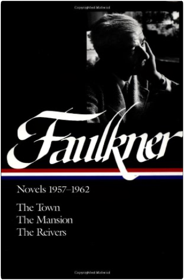 William Faulkner: Stories 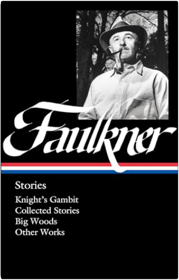 The Sound and the Fury 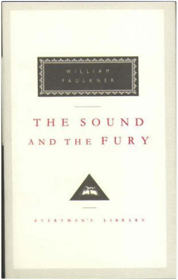 |


Delicious Library
Collection Total:
3,640 Items
3,640 Items
Last Updated:
Nov 2, 2025
Nov 2, 2025
 Made with Delicious Library
Made with Delicious Library